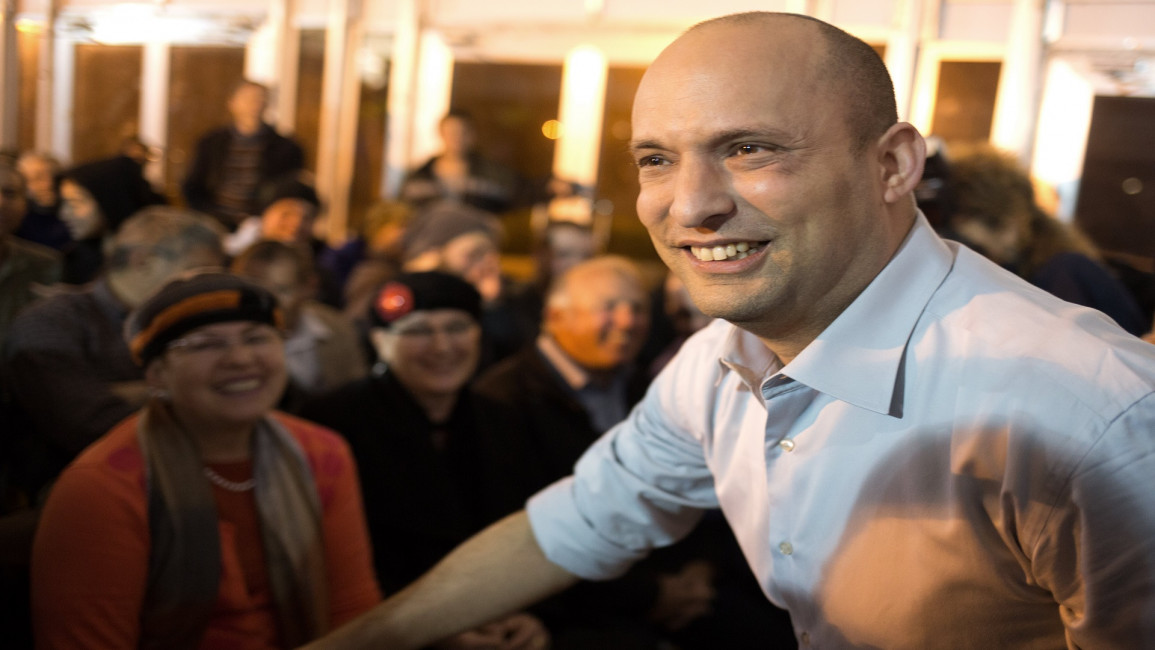
How Israel is inscribing violence through education
The extrajudicial killings by Israeli soldiers since the commencement of what came to be known as the Jerusalem Intifada have been characterised by an expected outburst of outrage followed by the usual complacency. Israel has benefited greatly from the latter, using the easily-accessible atmosphere of helplessness to increase its oppression of the Palestinian population.
However, since the last Knesset elections, a greater danger is becoming more imminent: that of Education Minister Naftali Bennett capitalising on violence in order to alter the Israeli narrative and, in turn, institutionalise it in education.
Once again, the alleged conscientiousness attributed to the IDF has created a dissonance between evidence that shows the cold-blooded murder of 21 year old Al-Fatah Ashraf from Hebron by an Israeli soldier. A video recording of the murder by B’Tselem volunteer Imad Abu Shamsiyyeh has provided clear evidence of human rights violations that are occurring routinely.
Shamsiyeh was threatened by the military for filming the murder. The video was made available by B’Tselem to Israeli military investigators. According to a report by Human Rights Watch, the interrogator threatened Abu Shamsiyyeh by reminding him of his exposed identity and the fact that he is surrounded by Israeli settlers, thus acknowledging the link between state terror and setter violence, and revealing the extent of Israeli impunity in the process.
Reneging on initial appeasement
Israeli Prime Minister Benjamin Netanyahu issued initial statements condemning the exposed murder: “What happened in Hebron does not represent the values of the IDF.” The rhetoric was swiftly contradicted by the usual belligerent remarks: “Questioning the IDF’s morality is outrageous and unacceptable [...] IDF soldiers, our children, maintain a high moral standard when they deal with bloodthirsty murderers.”
Again, the shift was predictable in order to reassert the constant misrepresentation of Palestinian resistance into terrorism, despite the legitimacy of armed struggle under international law.
The so-called Jerusalem Intifada is not lacking in fervour. However, it is naturally devoid of strategy and organisation, which is hampering efforts to communicate the struggle at an international level and thus makes it even easier for Israel to leverage support for its perpetual atrocities.
Netanyahu’s statements were bolstered by additional condescending remarks, as the ones made by Miri Regev who stated that the soldier “is standing up against the fire of commentators and politicians. Only after the investigation we will be able to decide if the soldier acted properly or not. In the meantime, we must support him.”
Hardly innovative, the web of political support for colonial violence has eclipsed the definition of propaganda. It is of no coincidence that Netanyahu has chosen ministers whose contempt for Palestinians is callously calculated, unrepentant and, furthermore, attempt to invalidate Palestinian narratives through state institutions.
Israeli Justice Minister Ayelet Shaked has been quoted on several occasions for her disturbing remarks encouraging assassinations during Operation Protective Edge in 2014. Yet, the minister wielding particular influence in the matter is Education Minister Naftali Bennett.
Colonial narratives and education
Notoriously known for his penchant for “killing Arabs” in the past and bragging about it, Bennett’s appointment as Education Minister is a strategic move that seeks to influence pedagogy both rhetorically as well as institutionally.
 |
Netanyahu has chosen ministers whose contempt for Palestinians is callously calculated, unrepentant and, furthermore, attempt to invalidate Palestinian narratives through state institutions. |  |
With regard to the Hebron extrajudicial killing, Bennett stated, “That some of this country’s leadership has jumped to conclusions before the trial is a mistake and are dancing to the tune of B’Tselem instead of the truth.” The discourse was uttered in relation to Netanyahu’s initial comments. However, the influence is vast.
Bennett is once again using his position as education minister to instil an alternative and erroneous version of events. Contradicting documented evidence - in this case a film showing the killing - is one of the oldest Zionist tricks to constantly reinvent the colonial narrative according to both, recent and historical violence perpetrated by Israel. An infusion of state rhetoric within the educational spectrum will serve to consolidate the power-constructed historical narratives that sustain the legitimacy of the settler-colonial state.
Dissemination of such narratives through education reinforces violence as a perverted right, rather than a violation. In addition, the strategy will also ensure further brainwash of Israeli settlers’ children, whose complicity increases with age and maturity. However, Bennett is ensuring that the complacency usually associated with children is also stripped away by imparting violent ideology and manipulation through the educational curriculum.
Ramona Wadi is an independent researcher, freelance journalist, book reviewer and blogger specialising in the struggle for memory in Chile and Palestine, colonial violence and the manipulation of international law. Follow her on Twitter: @walzerscent
Opinions expressed in this article remain those of the author and do not necessarily represent those of The New Arab, its editorial board or staff.




